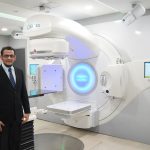In Malaysia, the choice to go for a simple screening test can be the defining moment between life and death. Mr B, a 52-year-old working professional, made the decision to undergo a routine immunochemical fecal occult blood test (iFOBT) as part of a health screening programme. The test returned positive, prompting a follow-up colonoscopy. A polyp with early-stage colorectal cancer was detected and removed before it could progress further. Treated at Stage I, his cancer was caught in time with minimal intervention, excellent prognosis, and full recovery.
His wife, Mrs B, aged 48, had a different story. Despite regular reminders from her clinic and encouragement from family, she delayed going for a mammogram. Like many women, she juggled multiple responsibilities, caring for her family, managing the household, and working part-time, hence she dismissed her own health needs.
She also struggled with embarrassment and a fear of hearing bad news. By the time she felt a lump and sought medical attention, the cancer had already spread to her lymph nodes and lungs. Diagnosed with Stage IV breast cancer, she is now undergoing aggressive chemotherapy and targeted treatment. Her prognosis and quality of life are significantly affected, and her journey forward remains uncertain.
These two stories, emerging from the same household, are not rare or isolated. They reflect a pressing reality in Malaysia: while early detection through cancer screening can save lives, screening uptake remains critically low, and too many patients are still diagnosed at late stages.
The numbers behind the reality
Breast cancer is one of the most common cancer among Malaysian women, accounting for approximately 32.9% of all female cancers. Shockingly, almost 48% of cases are diagnosed at Stage III or IV, when treatment is more complex, costly, and outcomes are poorer. The five-year survival rate for breast cancer in Malaysia stands at 67%, compared to over 80% in Singapore, underscoring the disparity in early detection and access to care.
Colorectal cancer is now the most common cancer among Malaysian men and the second most common among women, making up about 13.5–14% of all cancer cases nationally. However, a staggering 72–73% of colorectal cancers are diagnosed at advanced stages (III or IV). Worse still, screening uptake remains extremely low—less than 3% of eligible individuals have undergone a fecal occult blood test (FOBT) or colonoscopy.
Globally, the story is the same. Breast cancer accounted for 2.3 million new cases and over 670,000 deaths in 2022. Colorectal cancer contributes to nearly 10% of all cancer cases worldwide, with 1.9 million new cases and more than 900,000 deaths annually. Yet, where early screening programmes are widespread, survival rates significantly improve.
Why screening matters
Cancer screening works by identifying the disease at its earliest and most treatable stages, often before symptoms appear. Early-stage cancers typically require less aggressive treatment and have better outcomes. For example, the five-year survival rate for breast cancer detected at Stage I is around 87.5%, but this drops drastically to 23% at Stage IV. Similarly, colorectal cancer survival falls from 75.8% at Stage I to just 17.3% at Stage IV.
Screening also allows for the detection and removal of precancerous lesions, especially in colorectal cancer, potentially preventing cancer from developing altogether.
Some Barriers to Cancer Screening in Malaysia
Despite these clear benefits, Malaysia continues to struggle with low screening uptake due to several key barriers:
1. Low awareness and fatalistic beliefs
Many Malaysians are unaware of the need for regular cancer screening or how to access it. Cultural and religious beliefs also contribute to fatalistic attitudes, with some perceiving cancer as “fated” or unavoidable. This calls for culturally sensitive education campaigns in multiple languages, led by healthcare professionals, community leaders, and even local celebrities. These campaigns should emphasise that early detection saves lives and provide clear instructions on where and how to get screened.
2. Psychological and emotional barriers
Fear of diagnosis, embarrassment, particularly for procedures involving private parts and misconceptions about the screening process prevent many from stepping forward. Hence ,it is advisable to offer same-gender healthcare providers where it is feasible, to ensure privacy and respect patient’s dignity during screening, and normalise conversations around cancer in public forums, schools, and media.
3. Healthcare system gaps
Malaysia lacks a structured, population-wide national screening programme. Screening is often opportunistic, depending on the initiative of individual doctors or patients. Furthermore, there are limited numbers of oncologists and cancer specialists in public hospitals. Malaysia needs to develop a succinct national screening registry, offer risk assessments in digital apps like MySejahtera and Sehati app, and establish mobile screening units in rural and underserved areas. The government should also engage private general practitioners and CSOs to expand the screening network.
4. Cost and access limitations
While screening services are subsidised in government clinics, many individuals are unaware of these benefits or unsure where to go. Some healthcare providers may also fail to recommend screening during routine consultations due to time constraints or lack of training. Hence, promoting available government screening programmes more visibly (PEKA B40, PERKESO, SELCARE) is pivotal, integrate screening reminders into public health apps, and incentivise primary care doctors to actively recommend and conduct screenings.
Accessible screening services in Malaysia
Thankfully, various non-governmental organisations (NGOs) and public initiatives are working tirelessly to close the gap:
- National Cancer Society Malaysia (NCSM) offers free or subsidised breast, cervical, colorectal, and prostate cancer screenings at its clinics nationwide. Walk-ins are often welcomed.
- MAKNA (National Cancer Council Malaysia) supports nationwide screening outreach, prevention awareness campaigns, and financial aid for underprivileged patients.
- LPPKN (Lembaga Penduduk Dan Pembangunan Keluarga Negara) offers free cervical and breast cancer screening for eligible women.
- BCWA (Breast Cancer Welfare Association Malaysia) offers free breast cancer screening for eligible women.
- Government-led efforts such as PEKA B40, PERKESO, and SELCARE also provide free cancer screening for eligible groups via panel clinics and public health facilities.
Many of these services are mobile, offered in workplaces, communities, and even through digital appointments, making access easier than ever.
A call to action
Mr B’s story is a testament to the power of early detection; Mrs B’s journey is a painful reminder of what can happen without it. In a country where both breast and colorectal cancers are on the rise, it is no longer acceptable for awareness and access to be out of reach. We must normalise screening as a routine, preventive measure—just like vaccinations or blood pressure checks.
Cancer does not wait. But with timely screening, neither should we. The tools are available, the resources are growing, now all that’s needed is action.




